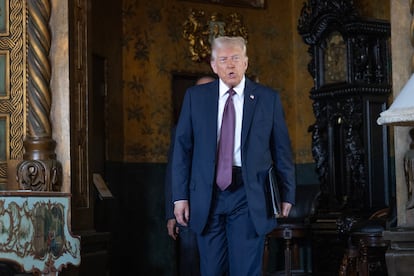Heavy-handed threats and headline-grabbing moves: The ‘Trump Show’ reaches the war on drugs
The Republican’s return to the White House heralds a new hunt for narco bosses, the designation of cartels as terrorist groups and exaggerated speeches promising the end of fentanyl trafficking and organized crime

The United States will have a new president on January 20, but the impact of Donald Trump’s return is already beginning to be felt on both sides of the border. From the permanent pressure on the Mexican government to the promise of designating the drug cartels as terrorist groups and ending fentanyl trafficking, the Republican’s return to the White House anticipates a new chapter in the war on drugs, marked by tough talk, an obsession with linking immigration to the rise of organized crime, and the continuation of Washington’s crusade against the big drug bosses. “What he wants to project is not numbers or data, but the show: the spectacle of headline-grabbing blows against criminals, operations, statements against Mexican authorities,” says the foreign affairs expert Mauricio Meschoulam. “He is projecting that he will do everything in his power and that he will go to any lengths to get what he wants, and it is a threat that Mexico has to take very seriously,” adds this academic from the Universidad Iberoamericana.
“All foreign gang members will be expelled and I will immediately designate the [drug] cartels as foreign terrorist organizations. I will do so immediately,” Trump assured his supporters at the end of December, announcing “the largest deportation operation in the history of the United States.” Besides the xenophobic statements and hard-line messages, the statements triggered renewed nervousness in Mexico, with fears that Washington could justify a military intervention in Mexican territory with the excuse of fighting terrorism, or use the crisis of violence in the country to increase pressure in other key areas of the bilateral relationship, such as trade or migration.
“Trump has two priorities when it comes to Mexico: migrants and drugs, specifically fentanyl,” says Ieva Jusionyte, a professor at Brown University. “People who support his policies talk about launching a war against the cartels, sending troops, but I think that is just rhetoric,” she adds. “I don’t think there will be any substantial changes in policies, but in approach, Trump and the Republicans are going to be more aggressive compared to the Joe Biden administration.”
Although the scope of the president-elect’s threats remains a matter of debate, experts predict that the shocks will be recurrent. The war on drugs has left an endless trail of drug lords who have been either arrested or killed, from Joaquín El Chapo Guzmán to Osiel Cárdenas, even though the effectiveness of the strategy against the leaders of the cartels has been called into question in the face of the enormous forces of supply and demand that dominate the illegal markets. Despite the announcements and the operations, violence continues to be present in Mexico and drugs are still present on the streets of the United States.
In Meschoulam’s view, Trump has a prerogative to differentiate himself as much as possible from Biden and show the world that he is someone who keeps his promises. “They are quite at ease with making threats and generating fear; he is a president who moves very well in conflict because it works for him,” he says. “Ending drug trafficking or migration is not feasible, but that is not what matters to him, what matters to him is that people perceive that he is fighting them with everything he has, and that he can force other actors to do whatever he wants.”
Claudia Sheinbaum’s government has sent signals that it is aware of Trump’s demands. A few weeks ago, it announced the largest seizure of fentanyl in the history of Mexico, and sent her security czar, Omar García Harfuch, to Sinaloa to send a message of diligence and that the country can be a reliable ally. “Sheinbaum is taking precautions, getting ahead of some demands,” says David Saucedo, a security expert. “She will show Trump that she is serious about the issue of organized crime and fentanyl production. This means raids and arrests of people linked to crime, all in the most spectacular and media-friendly way possible to showcase the results, at the cost of slow investigative work and addressing the root causes of crime,” says Jusionyte.
The Republican’s cross-threats have put at risk all the critical circuits of the diplomatic relationship, such as the threat of starting a tariff war if Mexican authorities do not toughen their immigration policy and put a stop to fentanyl. The next president has also sent messages with the appointment of a team of hawks in key positions, chiefly the ex-military Ron Johnson, a former Green Beret, as his ambassador to Mexico. “His background coincides with what Trump wants, a hard-liner who will be the executor and messenger of his own blackmail, his complaints and his requests,” Saucedo adds.
This specialist sees the possibility of new blows against Mexican politicians and former officials. After all, it was during Trump’s first presidency that authorities arrested former Nayarit prosecutor Edgar El Diablo Veytia; General Salvador Cienfuegos, former Secretary of Defense, and Genaro García Luna, former Secretary of Security. “Trump is aware that in Mexico there are years of political protection for organized crime, and he will surely try to repeat the dose,” says Saucedo.
The authorities are not the only ones adjusting their strategies. Experts agree that a feasible hypothesis is that the most visible criminal groups will lower their profile to guarantee their survival, although a fragile balance is anticipated. The fall of Ismael El Mayo Zambada has unleashed an internal war in the Sinaloa Cartel, which may reconfigure criminal geopolitics in Mexico and forcing them to focus on the next moves of other protagonists, such as the Jalisco Nueva Generación Cartel or smaller groups that may dispute the positions of El Mayo or Los Chapitos.
According to analysts, the drug traffickers’ response will not only be defensive. The tightening of immigration policy and border control opens up new possibilities for the wide range of illicit businesses of organized crime. “Mass deportations will affect criminal dynamics,” says Jusionyte. With fewer legal access routes, human smugglers can find new routes, raise prices for their services and take advantage of the opportunity to exploit more vulnerable people in transit.
The Trump factor has also left its mark on the courts. Joaquín and Ovidio Guzmán, sons of El Chapo, have been in negotiations for months to sign a plea bargain and avoid a lengthier sentence if they go to trial. The change of government in the United States may affect that possibility, with the expected arrival of new officials in the coming days, although a change in strategy would imply a major change. The new season of the Trump show has millions of viewers in Mexico and the United States on edge.
Sign up for our weekly newsletter to get more English-language news coverage from EL PAÍS USA Edition
Tu suscripción se está usando en otro dispositivo
¿Quieres añadir otro usuario a tu suscripción?
Si continúas leyendo en este dispositivo, no se podrá leer en el otro.
FlechaTu suscripción se está usando en otro dispositivo y solo puedes acceder a EL PAÍS desde un dispositivo a la vez.
Si quieres compartir tu cuenta, cambia tu suscripción a la modalidad Premium, así podrás añadir otro usuario. Cada uno accederá con su propia cuenta de email, lo que os permitirá personalizar vuestra experiencia en EL PAÍS.
¿Tienes una suscripción de empresa? Accede aquí para contratar más cuentas.
En el caso de no saber quién está usando tu cuenta, te recomendamos cambiar tu contraseña aquí.
Si decides continuar compartiendo tu cuenta, este mensaje se mostrará en tu dispositivo y en el de la otra persona que está usando tu cuenta de forma indefinida, afectando a tu experiencia de lectura. Puedes consultar aquí los términos y condiciones de la suscripción digital.









































